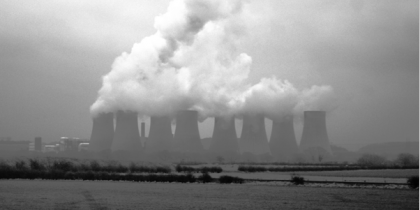
November 25, 2013, by Helen Whitehead
Harm and Climate Change, Part II
Some of the people affected by climate change (see the IPCC report) are yet to be born. These people will not first experience a planet and way of life unaffected by climate change, only to see that verdant utopia snatched away. Rather, they will only ever experience a degraded planet and way of life. In what sense, then, can we say that our resource-heavy lifestyles might be ‘harming’ them?
A Simple View of Harm
This is another way in which climate change forces us to re-evaluate our moral conceptual scheme, here by putting pressure on the concept of harm. (Which is, obviously, the key notion in J.S. Mill’s harm principle). On a simple view, you harm someone just in case your act makes them worse off than they were previous to that act. But this cannot be how our planet-degrading actions now harm future generations, because by definition these people do not exist prior to the acts that supposedly harm them.
A Counterfactual View
On another view, you harm someone if you make them worse off than they would otherwise have been, but for your action. This seems to work: if we degrade the planet (one might think) we leave future generations with a lower quality of life than they would otherwise have had. But in fact there are problems here too. As Derek Parfit has argued, one of the ways in which our actions affect the future is by affecting the identity of the people who will exist. Because of this, it is difficult to identify the particular victims of our planet-degrading acts.
The Non-Identity Problem
To illustrate the point, suppose we can choose exclusively between building a coal-fired power station (World A) and a wind-turbine array (World B). In World A coal-engineer Andy and coal-scientist Betty meet during the construction and have a son, Calvin. In World B, turbine-engineer Daniel and turbine-scientist Eva meet during the construction and have a daughter, Faye. Calvin only exists if World A is the future; Faye only exists if World B is the future. Suppose that building the coal-fired power station will degrade the planet more than building the wind-turbines, so that Calvin would have a lower quality of life than Faye. Now suppose we build the coal-fired power station, making World A the future. Have we harmed anyone? Well, not Faye, since she doesn’t exist in World A. Not Calvin, either, since if we hadn’t built the coal-fired power station, he would not have existed. Hence, Calvin is not worse off than he would otherwise have been, because in the alternative scenario – World B – he would not have existed. The conclusion seems to be that by degrading the planet by building the coal-fired power station we have not harmed anyone (and maybe that makes it OK?). The problem generalises. As Jeff McMahan puts it in this paper: “Social policies that reduce the quality of life in the further future cannot be criticized on the ground that they are against the interest of the particular people who will live at that time.”
Responses
There are at least two responses to this so-called “Non-Identity Problem”. We might further modify (or elucidate) the concept of harm, to generate the conclusion that building the coal-fired power station does in some way harm Calvin, even though he is not worse off than he would otherwise have been. A more radical alternative is to suggest that although we have an obligation not to reduce the quality of life for future generations, the source of this obligation is not the fact that we harm any particular people by doing so. Instead, we might say that the source of the obligation is intergenerational justice: that it is simply not fair to deprive future people (whoever they are) of the type of opportunities for fulfilment that we possess. If this is right, the notion of fairness is integral to discussions of ‘sustainability’: to act sustainably is to act in ways that are, at least, fair to future generations. In that case, it is not just current welfare policy, but current environmental policy that needs to know what fairness is. Either way, though, the case of climate change is an illuminating study for understanding the notion of ‘harm’ worth avoiding.
References
Derek Parfit, 1984. Reasons and Persons. OUP.
Jeff McMahan, 1981. “Review: Problems of Population Theory” in Ethics 92(1), pp.96-127.
Written by Neil Sinclair (neil.sinclair@nottingham.ac.uk)
Neil Sinclair is one of the contributors to Nottingham’s January FutureLearn MOOC Sustainability, Society and You.
This blog post was originally published in the University of Nottingham blog Think About It in July 2013
No comments yet, fill out a comment to be the first

Leave a Reply